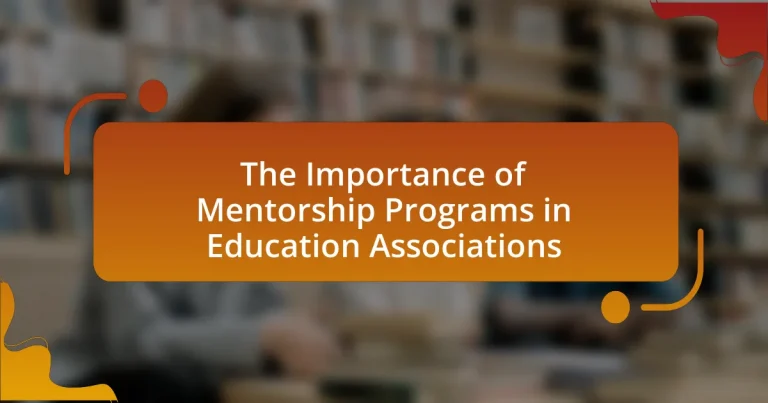Mentorship programs in education associations are structured initiatives that connect experienced educators with less experienced individuals to promote professional growth and development. These programs enhance teaching skills, job satisfaction, and retention rates among educators, while also contributing to improved student outcomes through personalized guidance. The article explores the functioning of mentorship programs, the roles of mentors and mentees, common structures, and the essential benefits they provide, including enhanced networking opportunities and support for diversity and inclusion. Additionally, it addresses the challenges faced by these programs and offers practical steps for education associations to implement effective mentorship initiatives.

What are Mentorship Programs in Education Associations?
Mentorship programs in education associations are structured initiatives designed to connect experienced educators with less experienced individuals to foster professional growth and development. These programs typically involve one-on-one relationships where mentors provide guidance, support, and resources to mentees, enhancing their teaching skills and career trajectories. Research indicates that mentorship can lead to improved job satisfaction and retention rates among educators, as evidenced by a study published in the “Journal of Educational Psychology,” which found that teachers who participated in mentorship programs reported higher levels of confidence and effectiveness in their roles.
How do mentorship programs function within educational contexts?
Mentorship programs in educational contexts function by pairing experienced individuals (mentors) with less experienced individuals (mentees) to facilitate personal and professional growth. These programs typically involve structured interactions, where mentors provide guidance, support, and resources to help mentees navigate academic challenges and career pathways. Research indicates that mentorship can enhance student retention rates, improve academic performance, and foster a sense of belonging within educational institutions. For instance, a study published in the Journal of Educational Psychology found that students who participated in mentorship programs reported higher levels of engagement and satisfaction, demonstrating the positive impact of such initiatives on educational outcomes.
What roles do mentors and mentees play in these programs?
In mentorship programs, mentors provide guidance, support, and expertise, while mentees seek knowledge, skills, and personal development. Mentors leverage their experience to help mentees navigate challenges and achieve their goals, fostering a relationship built on trust and mutual respect. Research indicates that effective mentorship can lead to improved academic performance and increased career opportunities for mentees, as evidenced by a study published in the Journal of Educational Psychology, which found that students with mentors reported higher levels of engagement and motivation.
What structures are commonly used in mentorship programs?
Common structures used in mentorship programs include one-on-one mentoring, group mentoring, peer mentoring, and e-mentoring. One-on-one mentoring pairs a mentor with a mentee for personalized guidance, which has been shown to enhance individual learning outcomes. Group mentoring involves multiple mentees learning from one or more mentors, fostering collaborative learning and diverse perspectives. Peer mentoring allows individuals at similar levels to support each other, promoting mutual growth and understanding. E-mentoring utilizes digital platforms to connect mentors and mentees, making mentorship accessible regardless of geographical barriers. These structures are effective in facilitating knowledge transfer and skill development within educational associations.
Why are mentorship programs essential in education associations?
Mentorship programs are essential in education associations because they facilitate professional development and enhance the skills of educators. These programs provide guidance, support, and knowledge transfer from experienced professionals to less experienced members, fostering a culture of continuous learning. Research indicates that mentorship can lead to improved teaching practices, increased job satisfaction, and higher retention rates among educators. For instance, a study published in the “Journal of Educational Psychology” found that teachers who participated in mentorship programs reported a 30% increase in their instructional effectiveness compared to those who did not engage in such programs. This evidence underscores the critical role mentorship plays in strengthening educational practices within associations.
What impact do mentorship programs have on professional development?
Mentorship programs significantly enhance professional development by providing guidance, support, and networking opportunities. These programs facilitate skill acquisition and knowledge transfer, which are crucial for career advancement. Research indicates that mentees often experience increased job satisfaction, improved performance, and higher retention rates. For instance, a study by the American Society for Training and Development found that 75% of executives credit their success to mentorship. This evidence underscores the vital role mentorship plays in fostering professional growth within educational associations.
How do these programs contribute to student success?
Mentorship programs in education associations contribute to student success by providing personalized guidance and support, which enhances academic performance and personal development. These programs facilitate one-on-one interactions between experienced mentors and students, allowing for tailored advice that addresses individual challenges and goals. Research indicates that students who engage in mentorship programs often experience higher retention rates and improved grades, as evidenced by a study published in the Journal of Educational Psychology, which found that mentored students had a 20% increase in GPA compared to their non-mentored peers. Additionally, mentorship fosters essential skills such as critical thinking and problem-solving, further preparing students for future academic and career endeavors.
What challenges do mentorship programs face in education associations?
Mentorship programs in education associations face several challenges, including a lack of resources, insufficient training for mentors, and difficulties in matching mentors with mentees. Limited funding often restricts the development and sustainability of these programs, making it hard to provide adequate support and materials. Additionally, mentors may not receive proper training, which can lead to ineffective guidance and a lack of confidence in their roles. Furthermore, finding suitable matches between mentors and mentees can be complicated due to differing goals, availability, and communication styles, which can hinder the effectiveness of the mentorship experience.
What barriers hinder the effectiveness of mentorship programs?
Barriers that hinder the effectiveness of mentorship programs include lack of time, insufficient training for mentors, and mismatched mentor-mentee pairs. Lack of time often results from mentors and mentees balancing multiple responsibilities, which can limit their engagement and commitment to the program. Insufficient training for mentors can lead to ineffective guidance, as mentors may not possess the necessary skills to support their mentees adequately. Mismatched pairs can create a disconnect in communication and expectations, reducing the overall impact of the mentorship experience. Research indicates that these factors significantly contribute to the challenges faced by mentorship programs, ultimately affecting their success and sustainability.
How can education associations overcome these challenges?
Education associations can overcome challenges by implementing structured mentorship programs that connect experienced educators with newcomers. These programs facilitate knowledge sharing, enhance professional development, and foster a supportive community. Research indicates that mentorship can significantly improve retention rates among new teachers, with studies showing that 80% of mentees report feeling more confident in their teaching abilities after participating in mentorship initiatives. By prioritizing mentorship, education associations can address issues such as high turnover rates and lack of support for new educators, ultimately leading to a more effective educational environment.

What are the benefits of Mentorship Programs in Education Associations?
Mentorship programs in education associations provide significant benefits, including enhanced professional development, increased retention rates, and improved student outcomes. These programs facilitate knowledge sharing and skill development, allowing less experienced educators to gain insights from seasoned professionals. Research indicates that mentorship can lead to a 20% increase in teacher retention, as new educators feel more supported and engaged in their roles. Additionally, studies show that students of mentored teachers often achieve higher academic performance, demonstrating the positive impact of mentorship on educational quality.
How do mentorship programs enhance networking opportunities?
Mentorship programs enhance networking opportunities by connecting individuals with experienced professionals in their field, facilitating valuable relationships. These programs create structured environments where mentees can engage with mentors, leading to introductions to broader professional networks. Research indicates that 70% of mentees report increased confidence in networking abilities, and 80% of mentors believe that mentoring enhances their own networking skills. This reciprocal relationship fosters a culture of collaboration and support, ultimately expanding both parties’ professional connections.
What types of connections can be fostered through mentorship?
Mentorship fosters several types of connections, including professional, personal, and academic relationships. Professional connections arise as mentors provide guidance, networking opportunities, and career advice, which can lead to job placements or promotions. Personal connections develop through shared experiences and emotional support, enhancing the mentee’s confidence and resilience. Academic connections are established when mentors assist mentees in navigating educational pathways, leading to improved academic performance and engagement. Research indicates that mentorship significantly enhances career outcomes, with studies showing that mentees are five times more likely to be promoted than those without mentors, highlighting the critical role of these connections in professional development.
How does networking through mentorship benefit career advancement?
Networking through mentorship significantly benefits career advancement by providing access to valuable industry insights, professional connections, and personalized guidance. Mentors often share their experiences and knowledge, which can help mentees navigate career challenges and identify opportunities for growth. Research indicates that individuals with mentors are promoted five times more often than those without, highlighting the impact of mentorship on career progression. Additionally, mentorship fosters relationships that can lead to job referrals and collaborations, further enhancing career prospects.
What skills do participants develop through mentorship programs?
Participants in mentorship programs develop a variety of skills, including communication, leadership, problem-solving, and networking abilities. These skills are cultivated through structured interactions with mentors who provide guidance, feedback, and support. Research indicates that 70% of mentored individuals report improved communication skills, while 67% enhance their leadership capabilities, as highlighted in a study by the American Psychological Association. Additionally, participants often gain critical problem-solving skills through real-world scenarios presented during mentorship, fostering a practical understanding of challenges in their field. Networking skills are also developed, as mentees learn to build professional relationships that can lead to future opportunities.
How do mentorship programs improve leadership skills?
Mentorship programs improve leadership skills by providing structured guidance and support from experienced leaders. These programs facilitate knowledge transfer, allowing mentees to learn effective decision-making, communication, and conflict resolution strategies directly from their mentors. Research indicates that participants in mentorship programs report enhanced self-confidence and a greater understanding of leadership dynamics, which are critical for effective leadership. For instance, a study published in the Journal of Leadership Education found that 70% of mentees experienced significant growth in their leadership capabilities after participating in mentorship initiatives. This evidence underscores the effectiveness of mentorship programs in cultivating essential leadership skills.
What communication skills are enhanced through mentorship experiences?
Mentorship experiences enhance several key communication skills, including active listening, feedback delivery, and interpersonal communication. Active listening is developed as mentors and mentees engage in meaningful dialogues, allowing mentees to fully understand and respond to feedback. Feedback delivery skills are refined as mentors practice providing constructive criticism and encouragement, which is essential for effective communication. Interpersonal communication skills are strengthened through regular interactions, fostering rapport and trust between mentors and mentees. Research indicates that mentorship programs significantly improve these skills, contributing to better professional relationships and enhanced collaboration in educational settings.
How do mentorship programs support diversity and inclusion in education?
Mentorship programs support diversity and inclusion in education by providing underrepresented students with access to guidance, resources, and networks that enhance their academic and professional development. These programs actively pair mentors from diverse backgrounds with mentees, fostering an environment where different perspectives are valued and shared. Research indicates that mentorship can lead to improved retention rates for minority students, as evidenced by a study from the National Mentoring Partnership, which found that mentored youth are 55% more likely to enroll in college and 78% more likely to volunteer regularly in their communities. By creating supportive relationships, mentorship programs help to bridge gaps in educational equity and promote a more inclusive academic culture.
What role do mentorship programs play in promoting underrepresented groups?
Mentorship programs play a crucial role in promoting underrepresented groups by providing guidance, support, and networking opportunities that enhance their professional development. These programs facilitate access to resources and knowledge that may otherwise be unavailable, helping individuals from marginalized backgrounds navigate educational and career pathways. Research indicates that mentorship can significantly improve retention rates and career advancement for underrepresented individuals; for example, a study by the National Mentoring Partnership found that mentees are 55% more likely to enroll in college and 78% more likely to hold leadership positions. This evidence underscores the effectiveness of mentorship programs in fostering equity and inclusion within educational associations and beyond.
How can mentorship programs be designed to be more inclusive?
Mentorship programs can be designed to be more inclusive by implementing diverse recruitment strategies for both mentors and mentees. This approach ensures representation from various backgrounds, including race, gender, socioeconomic status, and abilities. Research indicates that diverse mentorship relationships enhance learning outcomes and foster a sense of belonging among participants. For instance, a study published in the Journal of Vocational Behavior found that inclusive mentorship programs lead to higher satisfaction and engagement levels among mentees, particularly those from underrepresented groups. Additionally, providing training for mentors on cultural competency and bias can further promote inclusivity, as it equips them to understand and address the unique challenges faced by their mentees.

How can education associations implement effective Mentorship Programs?
Education associations can implement effective mentorship programs by establishing clear objectives, selecting qualified mentors, and providing structured training. Clear objectives ensure that the program aligns with the association’s goals, such as improving member retention or enhancing professional development. Selecting qualified mentors involves identifying experienced individuals who possess the necessary skills and knowledge to guide mentees effectively. Structured training equips mentors with the tools and techniques needed to foster productive relationships, ensuring that both mentors and mentees understand their roles and expectations. Research indicates that mentorship programs with defined goals and trained mentors lead to higher satisfaction rates among participants, thereby reinforcing the program’s effectiveness.
What best practices should be followed when establishing mentorship programs?
Establishing effective mentorship programs requires clear objectives, structured matching processes, and ongoing evaluation. Clear objectives ensure that both mentors and mentees understand the goals of the program, which can lead to more focused interactions and measurable outcomes. A structured matching process, based on skills, interests, and goals, enhances compatibility and increases the likelihood of successful relationships. Ongoing evaluation, through feedback and assessments, allows for continuous improvement of the program, ensuring it meets the evolving needs of participants. Research indicates that mentorship programs with these best practices report higher satisfaction rates and better outcomes for both mentors and mentees, as evidenced by a study published in the Journal of Educational Psychology, which found that structured mentorship significantly improved academic performance and personal development among participants.
How can education associations select suitable mentors?
Education associations can select suitable mentors by establishing clear criteria based on experience, expertise, and interpersonal skills. These criteria should include evaluating the mentor’s professional background, teaching experience, and ability to communicate effectively with mentees. Research indicates that effective mentorship significantly enhances professional development; for instance, a study by the National Mentoring Partnership found that mentored individuals are 55% more likely to enroll in graduate school and 78% more likely to hold leadership positions. By using these criteria and supporting data, education associations can ensure they choose mentors who will positively impact their mentees’ growth and success.
What criteria should be used to match mentors with mentees?
The criteria used to match mentors with mentees should include shared interests, complementary skills, and compatible communication styles. Shared interests ensure that both parties are engaged and motivated, while complementary skills allow the mentor to provide guidance in areas where the mentee seeks growth. Additionally, compatible communication styles facilitate effective interaction, enhancing the overall mentoring experience. Research indicates that these factors significantly improve the success of mentorship relationships, as highlighted in studies by the International Journal of Evidence Based Coaching and Mentoring, which found that alignment in these areas leads to higher satisfaction and better outcomes for both mentors and mentees.
What tools and resources can enhance mentorship programs?
Mentorship programs can be enhanced through various tools and resources such as mentorship software, training materials, and networking platforms. Mentorship software like MentorcliQ or Chronus facilitates matching mentors with mentees based on skills and goals, streamlining the process and improving engagement. Training materials, including workshops and online courses, equip mentors with effective communication and guidance techniques, which are essential for successful mentorship. Networking platforms, such as LinkedIn or specialized forums, provide opportunities for mentors and mentees to connect with a broader community, share experiences, and access additional resources. These tools collectively contribute to the effectiveness and reach of mentorship programs, fostering meaningful relationships and professional development.
How can technology be leveraged to support mentorship initiatives?
Technology can be leveraged to support mentorship initiatives by facilitating communication, providing resources, and enabling tracking of progress. Online platforms and applications allow mentors and mentees to connect easily, regardless of geographical barriers, enhancing accessibility. For instance, video conferencing tools like Zoom and messaging apps like Slack enable real-time interaction and collaboration. Additionally, technology can offer resources such as webinars, online courses, and forums that enrich the mentorship experience. Research shows that 70% of mentees report improved job performance due to access to digital resources and support systems. Furthermore, mentorship management software can track goals and progress, ensuring accountability and structured development.
What training resources are available for mentors and mentees?
Training resources available for mentors and mentees include structured programs, workshops, online courses, and mentorship handbooks. These resources are designed to enhance the skills and knowledge necessary for effective mentoring relationships. For instance, organizations like the International Mentoring Association provide comprehensive training modules that cover essential mentoring techniques and best practices. Additionally, platforms such as Coursera and LinkedIn Learning offer courses specifically tailored for mentors and mentees, focusing on communication, goal setting, and feedback mechanisms. Research indicates that structured training significantly improves the outcomes of mentorship programs, as evidenced by a study published in the Journal of Educational Psychology, which found that trained mentors reported higher satisfaction and effectiveness in their roles.
What are the key indicators of success for mentorship programs?
Key indicators of success for mentorship programs include participant satisfaction, goal achievement, retention rates, and professional development outcomes. Participant satisfaction can be measured through surveys that assess the perceived value of the mentorship experience. Goal achievement refers to the extent to which mentees meet their predefined objectives, which can be tracked through regular progress evaluations. Retention rates indicate the percentage of participants who continue in the program over time, reflecting its effectiveness and appeal. Professional development outcomes can be assessed by measuring advancements in skills, knowledge, and career progression of mentees, often supported by data from follow-up assessments or career tracking studies. These indicators collectively provide a comprehensive view of the program’s impact and effectiveness in fostering growth and development within educational associations.
How can education associations measure the effectiveness of their programs?
Education associations can measure the effectiveness of their programs through a combination of quantitative and qualitative assessments. Quantitative methods include analyzing participant outcomes, such as improved test scores or graduation rates, which can be tracked through standardized assessments and longitudinal studies. Qualitative methods involve gathering feedback from participants through surveys and interviews, allowing associations to understand the perceived value and impact of their programs. For instance, a study by the National Mentoring Partnership found that 70% of mentored students reported improved academic performance, demonstrating a direct correlation between mentorship programs and educational success. This dual approach provides a comprehensive evaluation of program effectiveness, ensuring that education associations can make data-driven decisions for future improvements.
What feedback mechanisms should be in place for continuous improvement?
Effective feedback mechanisms for continuous improvement in mentorship programs within education associations include regular surveys, one-on-one feedback sessions, and performance metrics analysis. Regular surveys allow participants to provide anonymous feedback on their experiences, which can highlight areas for enhancement. One-on-one feedback sessions facilitate open dialogue between mentors and mentees, fostering a deeper understanding of individual needs and challenges. Performance metrics analysis, such as tracking participant progress and satisfaction rates, provides quantifiable data that can inform program adjustments. These mechanisms collectively ensure that mentorship programs evolve based on participant input and measurable outcomes, leading to sustained improvement and effectiveness.
What practical steps can education associations take to foster successful mentorship?
Education associations can foster successful mentorship by implementing structured mentorship programs that include clear objectives, training for mentors, and regular evaluation. Structured programs ensure that both mentors and mentees understand their roles and expectations, which enhances the effectiveness of the mentorship experience. Training for mentors equips them with essential skills such as communication and feedback techniques, which are critical for guiding mentees effectively. Regular evaluation of the mentorship program allows associations to assess its impact, gather feedback, and make necessary adjustments to improve outcomes. Research indicates that structured mentorship programs lead to higher satisfaction rates among participants, as evidenced by a study published in the Journal of Educational Psychology, which found that well-defined mentorship frameworks significantly enhance the learning experience for mentees.


